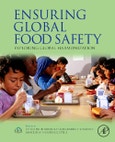Taking into account toxicity levels at normal consumption levels, intake per kg bodyweight and other acknowledged considerations, each chapter in this book will be based on one or more proven examples. It is intended to provide specific examples and potential improvements to the safety of the world's food supply, while also increasing the amount of food available to those in undernourished countries. This book is designed to to provide science-based tools for improving legislation and regulation.
Please Note: This is an On Demand product, delivery may take up to 11 working days after payment has been received.
Table of Contents
Preface;�Ensuring Global Food Safety A Public Health Priority and a Global Responsibility;�Development of Food Legislation around the World;�The Global Harmonization Initiative;�A simplified guide to understanding and using Food Safety Objectives and Performance Objectives;�Global harmonization of analytical methods;�Water determination in food;�Testing for Food Safety Using Competent Human Liver Cells;�Capacity Building-Harmonization and Achieving Food Safety;�Global food safety analysis capacity building: building capacity for Microbial Food Safety;�Global harmonization of the control of microbiological risks;�Towards Intended Normal Use (Part I): A European Appraisal of the Chloramphenicol Case and some Thoughts on the Potential of Global Harmonisation of Antibiotics Regulation;�Mycotoxin Management: An International Challenge;�Monosodium-Glutamate in Foods and its Biological Effects;�Food Packaging Legislation: Sanitary Aspects;�Nanotechnology and Food Safety;�Novel food processing technologies and regulatory hurdles;�Nutrition and bioavailabilty: sense and nonsense of nutrition labelling; New RDA's and Intended Normal Use (Part II)-Efficient Toos in the Universal Management of Risks and Benefits of Micronutrients; Nutraceuticals-possible future ingredients and food safety aspects; Harmonization of International Standards; The First Legislation for Foods with Health Claims in Korea; Bioactivity, safety and benefits of traditional and ethnic foods; Processing issues: acrylamide, furans and trans fatty acids; Managing low level chemical contaminants in foods
Authors
Christine Boisrobert Air Liquide, Houston, Texas, USA. Sangsuk Oh Professor at the department of Food and Nutrition at Ewha Womans University. Professor at the department of Food and Nutrition at Ewha Womans University and former official at the U.S. Food and Drug Administration. Aleksandra Stjepanovic Norwegian University of Life Sciences, As, Norwary. Huub Lelieveld formerly Unilever R&D, Vlaardingen, The Netherlands. Prof. dr. h.c. Huub Lelieveld, formerly with Unilever, now President of the Global Harmonization Initiative, a non-governmental organisation working towards globally harmonised and science based food safety regulations, is also a member of the Executive Committee and Past-President of EFFoST (the European Federation of Food Science and Technology), Founder and Past-President of EHEDG (the European Hygienic Engineering and Design Group). He is Fellow of IAFoST (the International Academy of Food Science and Technology), Fellow of IFT (the Institute of Food Technologists), served on the Governing Council of IUFoST (the International Union of Food Science and Technology) and has been Chair of the Nonthermal Processing and International divisions of IFT. At Unilever, he was responsible for hygienic processing and plant design and novel processing technologies.He is editor or co-editor of many books, on food hygiene, food safety and food processing technologies. He also wrote many chapters for such books as well as hundreds of articles in peer-reviewed scientific journals and in relevant magazines. He is visiting professor at the National University of Food Technologies in Kiev, Ukraine.








